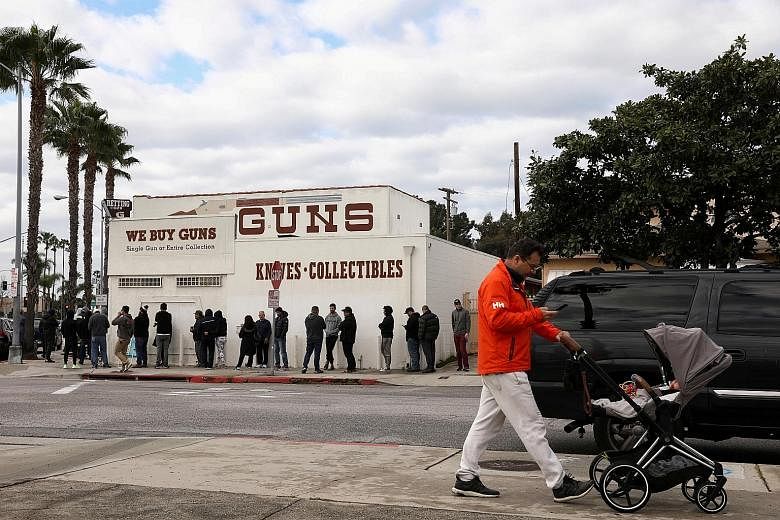More than 1,000 Asian Americans have logged on to a website to share stories of being verbally and physically attacked - many coughed at and spat upon - because the coronavirus originated in China.
A gun-store owner in Los Angeles County - home to the largest population of Asians in the United States at 1.5 million - told The Straits Times he has seen a surge in Asian customers in recent months, many of them first-time buyers.
There are certainly compelling reasons for Asian Americans to be fearful these days.
A Federal Bureau of Investigation (FBI) analysis, obtained by ABC News, "assesses that hate crime incidents against Asian Americans likely will surge across the US... based on the assumption that a portion of the US public will associate Covid-19 with China and Asian-American populations".
At a Texas supermarket last month, a man stabbed a Chinese-American family, including children aged two and six, because he thought the family was infecting people with the virus.
Hundreds of news reports about similar incidents this year prompted Dr Russell Jeung, a professor of Asian American studies at San Francisco State University, to set up an online reporting centre for personal accounts of such experiences.
Launched on March 19 with the help of two California-based advocacy groups - the Asian Pacific Planning and Policy Council, and Chinese for Affirmative Action - the Stop AAPI Hate website (www.a3pcon.org/stopaapihate) has amassed more than 1,000 reports, or about 100 a day, as of March 30.
"On a political level, we need to document what's going on," Dr Jeung explains.
"And track trends so we can have appropriate interventions at the community or policy level."
And the initiative offers guidance for those who submit stories, "like what to do when your kid is bullied or you face workplace discrimination".
Some striking trends are emerging from the submissions.
Almost 90 per cent cite "race" as the reason for discrimination, with two-thirds of incidents involving verbal harassment.
Three times more women than men have filed reports, and only 40 per cent of victims are Chinese.
Other Asian ethnicities, or "anybody who looks Chinese", can be targeted too, says Dr Jeung.
Sifting through these accounts has been "harrowing and depressing", he admits. Those who write in speak of being called names, having bottles thrown at them and Uber drivers refusing to pick them up.
"It's been hard to see how much hate there is and how virulent people's prejudices are," says the professor. And the bigotry, he believes, has not been helped by US President Donald Trump, who "insisted on calling it 'the Chinese virus'".
The identities of those who write in are kept confidential, but Dr Jeung, who is Chinese American, shares that he, his Korean-American wife and their son have experienced discrimination too.
"My wife got coughed at a park, and my son and I were shunned at a sporting goods store; it was a small incident but it was noticeable," says the 57-year-old.
"Like a lot of Asian Americans, we're now hyper aware of how people perceive us. And it just adds to the dread and stress over the upcoming surge of cases and deaths from the disease itself."
Other Asian Americans feel the same.
Ms Kristine Villanueva, a Filipino American in Washington DC, had an ugly experience a month ago.
The 26-year-old editor for a non-profit news organisation was returning to her apartment when a stranger began yelling at her.
The African-American man followed her inside and "asked our concierge why she was talking to me, and kept calling me 'a dirty b***h with the flu'" before he was asked to leave.
Mr Jeff Yang, a Taiwanese-American journalist and author, recently tweeted about an encounter of his own and got a flood of responses about similar experiences.
"I was waiting at a grocery store when an older white woman wearing a mask shouted a profanity at me, pulled off her mask and theatrically coughed in my direction.
"I was the only non-white person in the line."
"I think we've reached that point where (Asians) are no longer feeling this as an abstraction," says the 52-year-old.
-
Coronavirus: Stay informed and safe
-
The world now faces an unprecedented crisis because of the Covid-19 outbreak.
To help our readers stay informed on the latest health, economic and social developments related to the outbreak, we are making our news reports and analyses by our correspondents freely available to all.
You can also sign up for our free newsletter on the coronavirus outbreak.
We thank all of our readers for your support.
Should you wish to sign up for a subscription, that would be a great help to enable us in the newsroom to continue serving you in these difficult times.
Warren Fernandez
Editor-in-Chief
The Straits Times

